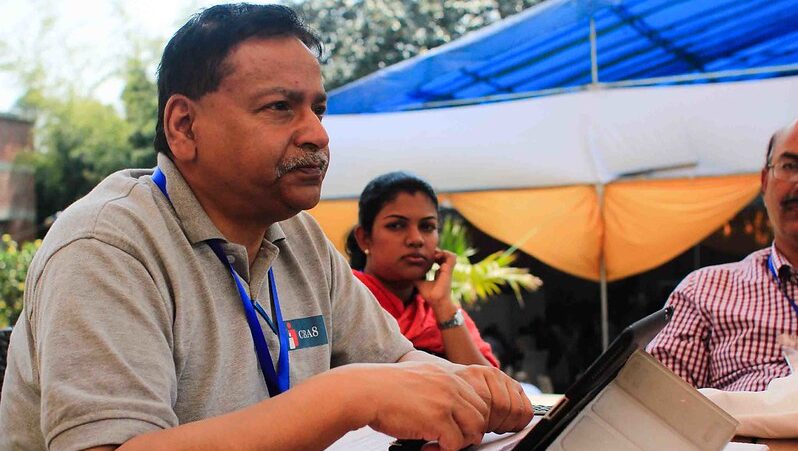Veteran Bangladeshi climate scientist and campaigner Saleemul Huq died on Sunday at the age of 71.
After the think tank he directed announced his death, tributes poured in from climate campaigners, diplomats, scientists and others.
The head of the Climate Action Network, Tasneem Essop, described him as a “giant in our movement and an inspiration to many of us”.
Dear ICCCAD, my condolences on this devastating loss. I am so deeply saddened by this news. Saleem was a giant in our movement & an inspiration to many of us. He will be sorely missed. We will keep fighting to ensure that his life’s work to achieve climate justice is fulfilled 💔 https://t.co/DRKFfdvfgY
— Tasneem Essop (@TasneemEssop) October 28, 2023
German climate envoy and former Greenpeace head Jennifer Morgan said “Saleem has been a driving force for climate justice since the beginning of the climate debate.”
She added: “His brilliant mind, ability to say what has to be said and dogged determination have been beacons for decades.”
As a scientist, campaigner and adviser, Saleemul Huq championed developing countries and their calls for support tackling climate change and addressing its impacts.
The young botanist
Saleemul Huq was born in 1952 and moved to London in the 1970s to study plant biochemistry at University College London.
On his return to Bangladesh in the 1980s, he set up the Bangladesh Centre for Advanced Studies, the nation’s first think-tank on environmental issues.
With colleagues, he carried out some of the earliest scientific studies on sea level rise, showing the devastating effects that climate change would have on low-lying Bangladesh.
When the Intergovernmental Panel on Climate Change produced its first chapter on adapting to climate change in the 1990s, Huq was a lead author.
On later reports, he took a more senior role as co-ordinating lead author before making way for younger researchers.
Poorest countries champion
Alongside his science, Huq was a campaigner and advised the world’s least developed countries (LDCs) and the countries most vulnerable to climate change (V20).
In this capacity, he attended every single Cop summit from Cop1 in Berlin in 1995 to Cop27 in Egypt in Sharm el-Sheikh last year. He was an adviser to the Cop28 presidency and was planning to attend the talks in Dubai next month.
Over these decades, he relentlessly emphasised the importance of adapting to climate changes as well as reducing emissions.
What a loss. We first met in Dhaka in 1993 and then and now he was unwavering in his pursuit of justice. Tagore said “You can’t cross the sea merely by standing and staring at the water.” Saleem, quietly determined, drove the whole world forward. What a life. আমার গভীর সহানুভূতি https://t.co/nVxH8eOu2i
— Rachel Kyte (@rkyte365) October 28, 2023
As the impacts of climate change became clearer, he pushed too for the countries which predominately caused the climate crisis to help those suffering most from it.
That push culminated last year at Cop27, when governments agreed to set up a loss and damage fund.
After that agreement, he wrote in Climate Home that the committee tasked with setting up the fund need to show “urgency”.
“Please try your best to get something up and operational by Cop28 rather than Cop29 or Cop30” he pleaded. The committee is now working overtime to iron out differences before Cop28.
Tributes paid
Huq was the director of the International Center for Climate Change and Development. The organisation’s post on X (formerly Twitter) announcing his death was re-posted over 1,000 times and received hundreds of replies.
Acclaimed Indian author Amitav Ghosh was among those paying tribute, describing Huq as “one of the most important voices from the global south, tireless in his advocacy of climate justice”. Many of the respondents praised Huq’s good humour and his graciousness in giving time to young people at the start of their career.
My Tribute to Saleemul Huq 🙏
Saleem, your departure was far too soon. Our mission remains unfinished…
It’s hard to grasp that you won’t be at COP28, especially when you’ve attended all 27 preceding COPs.
Just yesterday, as I virtually attended the Loss & Damage session in… pic.twitter.com/RMEjIGHhhX
— Harjeet Singh (@harjeet11) October 29, 2023
Climate Action Network’s Harjeet Singh campaigned alongside Huq on adaptation and loss and damage.
He told Climate Home: “The ever-smiling Saleem exuded a calm that made everyone feel at ease when approaching him. Whether he was conversing with a young researcher or a minister, he consistently showed the same respect and humility.”
He added: “Despite his profound academic background and deep knowledge, he had an unparalleled ability to convey complex ideas in simple terms. His talent for turning an idea into reality was truly exceptional. He would patiently and tirelessly train students and young negotiators on the complexities of climate negotiations.”
